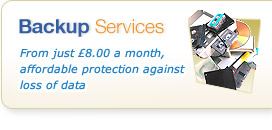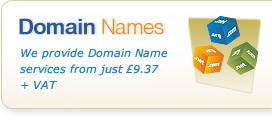Picking the right Small Business Broadband
18th April 2014

Choosing a suitable broadband option for Small Businesses should be a doddle, right? All connections are the same so just pick the cheapest one? Just go with BT?
Actually - getting the right choice of Broadband makes more difference than you might think. We often help customers choose - or migrate/move broadband away from other providers so they get a better standard of service.
Indeed on Wednesday a customer near our Exeter offices in Devon was surprised to learn that other providers can offer a better - and faster - service than BT. All too often we hear this and the reality isn't like it might seem and actually in some cases BT *don't* offer (and won't) offer the best connection speeds in some scenarios.
So how do you choose?
With many options to chose from and a need to be connected to do just about anything in a modern business world, Small Businesses really should take broadband seriously - failing to choose a reliable, fast internet connection that you can depend on can be a costly mistake for you - often the relatively trivial cost of picking a better service pays for itself really quickly when you realise how difficult it is to get many tasks done without a working connection - especially if you're paying others!
First you need to know the technologies available:
Standard Broadband - ADSL/ADSL2+
ASDL stands for asymmetric digital subscriber line - a technical term which basically means it's faster in one direction than the other. Typically this means download speeds are many times faster than your upload speeds. Download speeds affect how quickly you can view web pages, download e-mails and so on, while upload speeds determine how fast you can send files, backup and essentially transmit data to others. ADSL is the basis for most connections available today - including most "fibre" connections - but to most people, ADSL means standard broadband - without fibre.
There are 2 main flavours in the UK - ADSL and ADSL2+. ADSL is the older standard and typically provided connections that were up to 8 meg download speeds, and between 448kbps and 832kbps upload (less than 1 meg). In some areas this is still as good as it gets if alternative providers and/or BT haven't upgraded them.
ADSL2+ offers speeds of up to 24 meg for downloads, and typically 1.3 meg of uploads - there are variants (including those NOT offered by the so-called leaders BT) of up to 2.5 meg for uploads - it can make a huge difference! Most customers see speeds of 12 meg or better for downloads in our experience. Most providers today offer the up to 24 meg service and up to 1.3 meg upload at most, unlike the more niche but specialist providers such as ourselves that offer the enhanced upload speeds.
Recommendation: Standard ADSL/ADSL2+ is fine where you have no other options, and where you only have a small number of users. It's recommended where you have modest needs, can live without broadband and don't need really good speeds. You should though think carefully about whether downtime would stop you operating - and how much it would cost in lost productivity (especially if you're paying staff not to be able to work!) Take a look at our Standard Broadband for this type of use.
Bonded Broadband
Bonded broadband is ASDL - but super powered! With the ability to have four (or even 8 in some cases) ASDL lines at once, you can have four times the speed and power of your traditional ASDL line. Sometimes you'll be offered "load balanced" broadband - or buy a router that let's you do this. This is almost always not true bonding - it EITHER operates by using one connection under normal conditions, using the secondary link only if the first fails OR alternates outbound connections - this means no single user can ever get more than the speed of 1 line for any given download - so it's quite inefficient. Incoming connections aren't "doubled". It's really a cheap and cheerful (but not effective) option.
Proper Bonded Broadband - such as our own Managed Resilient Bonded service actually gives you the power of 2 or more lines at once - as if they were just one bigger connection. One download can use the total bandwidth (speed) available across all lines, and if any line has a failure you stay connected - albeit with temporarily reduced speeds. It's really useful if you need extra upload (sending) speed too since you really can combine everything (with just 2 lines we can potentially give you 5 meg upload (and all without fibre) - as well as if you have incoming connections (perhaps to internal servers for remote users).
Recommendation: This type of service is recommended for customers who can't get any fibre service, or where fibre is available but you also want some resilience against a line failing (something more of a risk with fibre than you might think), any business with serious internet use and dependency, and especially if you have lots of staff. It can be a good option where you don't quite want or need the expense of "Leased Lines" or other equivalent services.
Fibre Broadband (known as FTTC or FTTP)
Fibre can offer really good speeds (by comparison to traditional broadband) to many. It's typically available in 2 different types. FTTC is the usual type - and where available most people get this. It can offer "up to" 40 or 80 meg speeds for downloads (like normal ADSL, speeds vary by distance), depending on your service plan. It does however have the potential to offer much better speeds for upload - 2 meg, 10 meg or even 20 meg is possible from a single line - again distance depending. FTTC basically means that there is fibre to a nearby cabinet ("Fibre To The Cabinet") - after which your existing copper phone line is used. It might be interesting to know that normal Virgin Media connections are ALSO like this - the fibre ends at the nearby cabinet, and then normal cable (COAX in Virgin's case) is used.
In a few areas, an enhanced service is available - known as FTTP - this means "Fibre to the Premises" - and as it suggests means you have an actual fibre connection to your home or business. Right now, this is very limited in availability but gives up to 300-330 meg connections for download (but still for commercial reasons rather than technology) up to 30 meg upload.
Recommendation: If you have high upload demands and can get fibre, or have lots of users, Fibre is a good choice. But please see our Resilience notes below because Fibre - just like normal broadband can go wrong and is actually more risky than traditional broadband as the cabinets have equipment, need power and are vulnerable to damage, theft or loss of power more than traditional broadband. VPW offer all types of Fibre Service so have a look at our Fibre Broadband options.
More about Resilience and Bonded Connections...
We can't stress enough that resilience is important when you are looking at broadband for your business. Without some form of backup or resilience, loss of an internet connection really can be costly. It's worth remembering that except in exceptional cases, Broadband, Fibre and so on does NOT have any "Service Level" guarantee and does not offer enhanced response & repair.
Sadly, resilience has become a dangerously generic term - however, there is a world of difference between rhetoric and reality, and a network outage could have a disastrous effect on any Small Business which is increasing becoming 24/7 or relying upon internet access.
At VPW, we take resilience really seriously, so our Managed Resilient Bonded Broadband services not only provide multiple connections, but we route them via different wholesale networks wherever possible, try to reduce reliance on the BT network as much as we possibly can, and generally take plenty of extra steps. That's a level of bonded service that other providers don't offer as both connections still go through the same network - yet some outages are caused when a provider has an outage - something you could avoid with our service.
If you choose Fibre, remember that Fibre is also at risk - we recommend having a managed bonded or fail over service from us, with the secondary connection NOT using fibre - so any fibre issue affecting your cabinet (which can and DOES happen), won't leave you offline.
Next Steps?
Choosing a managed service from VPW Systems can ensure that your business can stay online even while competitors are struggling. Managed services mean that everything is taken care of so you can focus on your business, and Resilient Bonded Services help you avoid outages. For more information, call us today on 01392 950 950. Take a look at our Broadband & Connectivity Services




